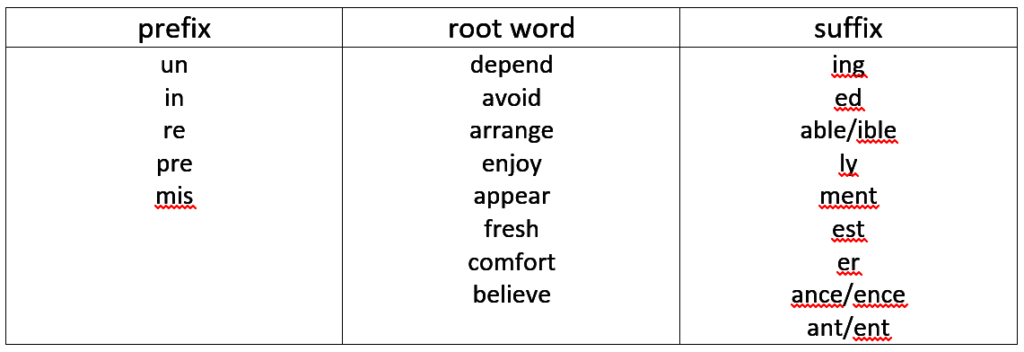11 January 2019
The spellings this week are all verbs which need to double up for a short vowel when adding the suffix ed or ing. The words in the first column are all in the infinitive (eg. to pat). The words in the second column with the suffixes are the words which will be tested.
| to pat patted |
| to hop hopped |
| to drop dropped |
| to trap trapped |
| to hum humming |
| to slip slipping |
| to clap clapping |
| to grin grinning |
11 January 2019
|
ture |
||||
| This week’s spelling list is formed using words that end with ‘-ture’. We are recapping a Y4 spelling rule so children should already know these words or this rule. If you don’t know what any of the words mean, find out! Can you show them in a creative way? Can you write them in your own sentences? Challenge yourself to use a relative clause or parenthesis. | ||||
| capture | creature | future | immature | mature |
| mixture | moisture | nature | nurture | fixture |
11 January 2019
This week, our spelling homework consists of words that have the ‘g’ sound, spelt /gue/ or ‘q’ sound, spelt /que/.
These words will be tested on Friday 18th January.
Mosque / technique / unique / antique / tongue / vague / fatigue / intrigue
11 January 2019
Create ways for you to remember how to spell these words and generally practise using the strategies in the back of your homework book. Spelling practice is best done little and often so make sure you come back to the spellings at least three times in the week. Date your practice and ask an adult to sign it to show that you’re practising regularly. There will be a test on Friday 18 January.
- accommodate
- accompany
- according
- achieve
- aggressive
- amateur
- ancient
- apparent
- appreciate
- attached
- available
- average
- awkward
14 December 2018
This week, spelling homework contains words that have the /I/ sound but are spelt with a Y.
These words will be tested on Friday 21 December.
| gym |
| myth |
| pyramid |
| cygnet |
| Egypt |
| mystery |
We are learning our 4 times tables.
14 December 2018
The spellings this week are to look at and begin to practise the Year 2 common exception word list.
Your child may be a confident speller. If this is the case, they should pick out the words that they struggle to spell and practise these. If your child finds spelling more difficult and needs to learn a lot of the words, they are split into sets in the homework book. You could work on a set of words every couple of weeks alongside the other weekly spelling lists to slowly build their confidence.
14 December 2018
This week’s spellings require the children to apply a number of the skills we’ve learnt so far this year.
We’ve learnt all sorts of rules about adding prefixes and suffixes to words this term. Using the table below, see how many different (and real) words you can build using the prefixes, root words and suffixes supplied. If you can think of your own too, that’s great.

There will be no test on Friday 21 December but we will share the words we’ve built with each other.
07 December 2018
This week, the phoneme we’re learning about is u which, in these spellings, is spelled with an o.
| other |
| love |
| worry |
| money |
| mother |
| brother |
| nothing |
| Monday |
07 December 2018
This week, our spellings focus on words which contain the ‘ew’ digraph. This digraph can make two slightly different sounds. It can make the ‘oo’ and the ‘you’ sound.
| blew |
| threw |
| stew |
| crew |
| grew |
| screw |
07 November 2018
Spellings
This week’s spelling list is formed using our Must Do homophones for Year 3. Children should practise listening to a sentence read to them out loud and writing the correct homophone. For example:
“They’re going to a party this weekend.”
Can you think of any fun ways to remember which word is right? Can you write some silly sentences? Can you show your words creatively?
- your/you’re
- its/it’s
- of/off
- they’re/their/there
- which/witch
Children should learn these in preparation for a spelling test on Friday 13 December.
We are learning our 4 times tables.